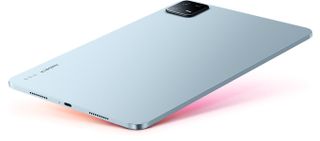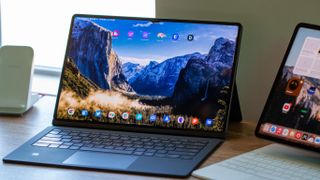Apple isn't Samsung's biggest threat in the tablet market right now
Chinese OEMs have managed to shine in this sector.

Despite offering a comfortable middle ground between phones and laptops, both Samsung and Apple saw a surprising decline in tablet sales in the first quarter of 2024, raising questions about the future of these devices, particularly while players in China, such as Huawei and Xiaomi, enjoy a healthy increase in tablet adoption.
In 2023, worldwide tablet shipments declined 17.4% year over year in the fourth quarter, the largest decline since 2016. For the calendar year 2023, tablet shipments totaled 128.5 million units worldwide, a decline of 20.5% compared to 2022 and the lowest annual volume since 2011.
"With no significant improvements to the economy and consumers allocating their money to things beyond consumer electronics, tablets may not be very high on the priority list," said Anuroopa Nataraj, senior research analyst with IDC's Mobility and Consumer Device Trackers.
Recent numbers suggest that after over two years of decline, worldwide tablet shipments posted a year-over-year growth of 0.5% in the first quarter of 2024; even though this may seem small, the sales were about 30.8 million units, but it doesn't look good for Samsung and Apple.
Samsung vs. Apple vs. the world

Samsung saw a decline in tablet shipments this quarter, with around 6.7 million units sold—a decrease from the 7.1 million units sold in the same quarter of 2023. Research manager Jitesh Ubrani at IDC points out this could be due to the slower economy. "It's essentially due to a slowdown in consumer demand in the U.S. for tablets, especially the premium tier," Ubrani told me over email. "Beyond that, there's also been an uplift in PCs, which steals a share of wallet."
It's not for a lack of trying on Samsung's part. Last year, Samsung launched the Galaxy Tab A9, Galaxy Tab A9 Plus, Galaxy Tab S9 FE, and Galaxy Tab S9 FE Plus in the last quarter of 2023, later introducing the Galaxy Tab S6 Lite (2024) in the first quarter of 2024. According to Samsung's Q4 earnings report, the company seeks to maintain sales momentum by expanding Galaxy AI to existing and new flagship products across foldable devices and tablets.
However, Samsung might face challenges keeping up with the premium range and the features that users may find appealing on iPads. Additionally, Ubrani says that even in the mid-lower tiers, Samsung faces competition from Amazon and TCL in the U.S.
Be an expert in 5 minutes
Get the latest news from Android Central, your trusted companion in the world of Android
"To turn things around, Samsung can resort to bundling, which they have done and continue to do with wearables today. Beyond that, enabling new use cases—which is one of the toughest things to do for tablets—or servicing niche audiences (e.g., What iPad Pro is doing) is likely the only other way out."
On the other hand, Apple has also seen a similar decline in iPad sales this quarter. Even though it's at the top of the list, Apple faced a bit of a lull last year as sales declined 8.5% year over year. Per IDC's report, Apple focused on clearing out inventory of older models before the expected launch of new models. However, it could still ship out 9.9 million units this quarter. Ubrani feels that Apple's recent refresh of the iPad Air and iPad Pro will go a long way and turn things around for the tablet business.

While Samsung and Apple may be at the top of the charts, Huawei held third place this quarter with impressive year-over-year growth of 43.6% and shipments of 2.9 million units. IDC interprets that the Chinese tech giant likely benefitted from the resurgence of its smartphone business and grew its market share by 2.8 basis points compared to last year.
Xiaomi also retained its spot in the top five, with a remarkable yearly growth of 92.6% and 1.8 million units in shipment. According to Ubrani, a few factors have helped the company boost tablet shipments.
"Xiaomi has been focusing on promotions, and most importantly, demand in Asia is recovering quicker than in the US. Asia also has lower penetration rates, so an uptick in demand is expected." The report stated that even outside China, its largest market, Xiaomi grew by triple digits across almost all regions where it ships.
How can these top players shake things up?

While Samsung and Apple continue to dominate the smartphone market, analysts suggest they have to start focusing on consumer spending habits and trends as they seem to be shifting.
One crucial area of improvement could be innovation, as year-on-year tablet upgrades mainly focus on hardware changes like faster processors, better screens (iPad Pro's OLED upgrade), or sleeker designs—but these may not be enough for customers to spend the extra money on tablets.
These tech giants could explore software upgrades like implementing AI features that will address why tablets are bought in the first place—accessibility and ease of multitasking on the go. Integrating features like Galaxy AI into tablets could help benefit students, a demographic that could benefit from more accessible tablet options. This would provide a portable computing option with a smart assistant that summarizes lectures or helps them organize their day.
It's worth noting that this demographic focuses on value. With the surging prices of smartphones, consumers are likely more interested in spending less on a tablet or not buying one at all. This is where bundling and promotions come into play, as Ubrani pointed out, especially for families looking for cost-effective options for kids and teens.
Finally, the sheer number of tablet options available could lead to "decision paralysis." By considering users' needs and budgets, Samsung could benefit from simplifying its lineup while ensuring it continues to introduce unique features that make the choice less stressful. Nevertheless, it's clear that the current strategy isn't panning out, and Samsung may need to rethink its tablet strategy going forward if it wants to better compete with smaller brands.

Nandika Ravi is an Editor for Android Central. Based in Toronto, after rocking the news scene as a Multimedia Reporter and Editor at Rogers Sports and Media, she now brings her expertise into the Tech ecosystem. When not breaking tech news, you can catch her sipping coffee at cosy cafes, exploring new trails with her boxer dog or leveling up in the gaming universe.
-
janshien How about Samsung come out with something like a 7" high performance tablet? There is not a single entry since the Nexus 7 came out over a decade ago. I wanted something to travel with and also use as a muti-platform e-reader and had to buy a Kindle Fire 7 that can not even decode a x265 video or play a modern game.Reply -
Daniel Gomes Basically Xiaomi is the big winner here and clearly it's because of price. People probably getting a tablet for the first time and wanted a decent budget option. Most people use them to watch videos/you tube etc. and so don't want to pay Samsung and Apple prices.Reply
The Huawei sales were a spike off the back of their smartphone sales but will likely subside again once the hype wears off. -
10_26 I don't see why there would be a 1st quarter 2024 growth for Samsung in the tablet market. The Tab S7-S9 line are all excellent tablets even today with nothing as of yet newly introduced. I just traded in my Tab S7 Plus for the Tab S9 Plus and I honestly see no difference between the two other than OS updates. I plan to hold onto the tablet for the next 5 or 6 years. The Chinese market will follow Apple and Samsung once the market is saturated with them. With the new iPad just released, the verdict is still out for Apple in the 2nd quarter.Reply